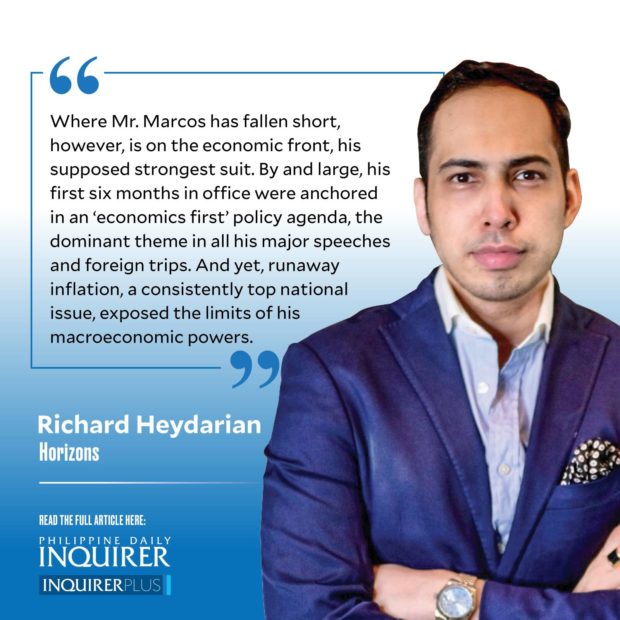Marcos Jr.’s political honeymoon: An assessment

Fierce critics warned of a potential return to dictatorship, albeit with distinct 21st-century characteristics. Hardcore loyalists, in turn, welcomed the Marcoses’ return as an opportunity to radically upend a political system largely built on the legacy of their ultimate bête noire, the Aquinos. In a way, both sides have, so far, been proven wrong.
It must be said that, as expected, the sole son of the former strongman has enjoyed high approval ratings like almost all of his predecessors in their early months in office. And crucially, let’s keep in mind that President Marcos Jr. has had to also grapple with former president Rodrigo Duterte’s legacy on every major policy front.
Article continues after this advertisementSo, dear reader, let’s briefly assess Mr. Marcos’ first six months in office, which is often considered a president’s political “honeymoon,” along five themes.
First of all, he has dispensed with the uber-populist antics of his immediate predecessor, who showed minimal regard for basic decorum. Lest we forget, Duterte vowed, shortly after his victory in 2016, “I’m really a rude person. I’m enjoying my last time as a rude person. [But] [w]hen I become president, when I take my oath of office … There will be a metamorphosis.” As in most of his (empty) promises, that would end up in the dustbin of history. In a way, the “metamorphosis” came under Mr. Marcos, who has projected traditional statesmanship and tried to embody the dignity of the office to the nines.
Thankfully, we no longer have a president who cusses at world leaders, especially our closest allies, nor a demagogue who gets a kick out of political incorrectness. Throughout his six months in office, Mr. Marcos shunned any insulting comments against anyone, including his fiercest critics. Thanks to his “creative communications” director, who has a knack for producing glossy vlogs, Mr. Marcos has perfected the art of performative statesmanship.
Article continues after this advertisementBut this brings us to the second point, which is the Shakespearean court politics in Malacañang. The man on the top has been far from unhinged, and yet the frequency by which the royal court has been shedding top Cabinet members, including a former executive secretary, is astonishing. Not to mention, Mr. Marcos is yet to appoint a full-fledged secretary for the departments of health, agriculture, and defense.
When it comes to managing alliances, however, Mr. Marcos has been relatively successful so far. In his first six months in office, he has radically recalibrated the former president’s key policies, most notably the “drug war,” while maintaining relatively cordial relations with his vice president, Sara Duterte. Many pro-Duterte bloggers and diehard supporters, however, have been extremely critical of the current administration’s decision to tweak or sideline their top priorities. So, things could get very interesting in the upcoming midterm elections.
On foreign policy, however, Mr. Marcos has been largely successful, so far. In just a few months, he managed to not only restore but even expand strategic relations with traditional allies, most especially the US. Meanwhile, he has managed to maintain relatively robust relations with China, but minus Duterte’s subservient rhetoric and defeatist stance on the South China Sea. Whether the “friends to all” doctrine is sustainable over the next five years is another question.
Where Mr. Marcos has fallen short, however, is on the economic front, his supposed strongest suit. By and large, his first six months in office were anchored in an “economics first” policy agenda, the dominant theme in all his major speeches and foreign trips. And yet, runaway inflation, a consistently top national issue, exposed the limits of his macroeconomic powers.
In fairness, we neither have a hyperinflation crisis nor is the inflation situation purely a reflection of domestic policy shortcomings. Yet, for a technocratic populist such as Mr. Marcos, major economic achievements are a must. Vlogging is one thing; steering a whole nation in an era of polycrisis is another.
—————-















